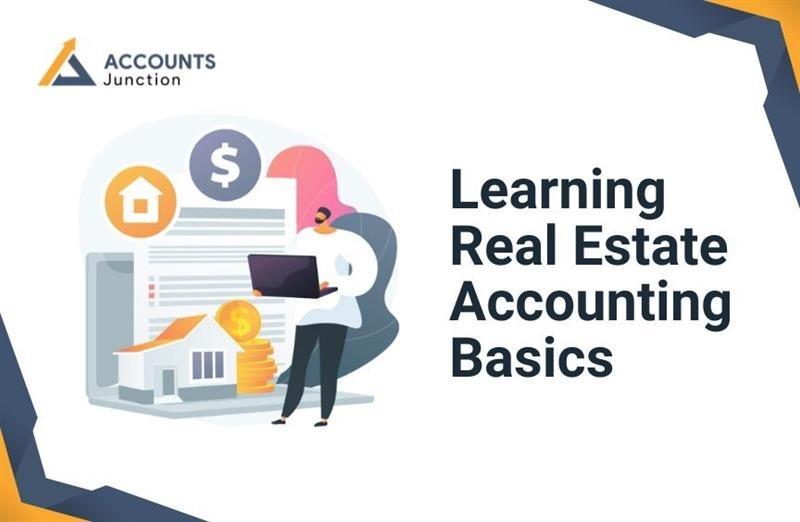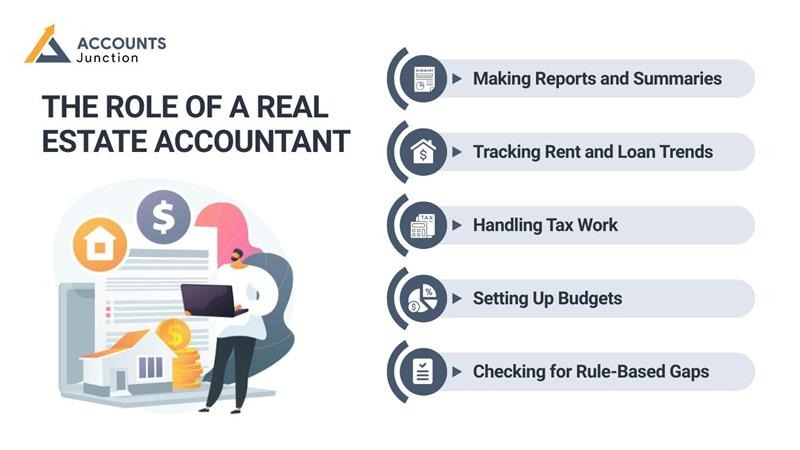
Learning Real Estate Accounting Basics
In real estate and property work, clear accounting is the basis of sound money control. It helps track income, note each cost, and show the true worth of what a business owns. For any owner or investor, learning real estate accounting basics can bring order, truth, and ease to every money task.
Real estate accounting is more than keeping books. It may also include planning, review, and study of rent and cost data. With a clear system, one can see how each site performs, find new chances for gain, and cut money risk.
Though real estate may seem complex, its accounting side turns simple once the core ideas are known. By learning these basics, a person can manage assets well and keep every record fair and clear.
What Real Estate Accounting Means
Real Estate Accounting Basics means keeping a full record of all money tasks tied to a property. It may cover income from rent, cost of upkeep, taxes, and loan payments.
It may look like normal accounting, but it focuses on assets that last long, like land or buildings. Each entry tells how those assets are used or changed over time.
The goal is not only to keep data. It is to help managers and owners make clear and wise choices about the future.
Why Learn Real Estate Accounting Basics
Learning the real estate accounting basics can help in many ways. It brings order, cuts risk, and adds clarity to how a property works.
a. Clear View of Finances
When all income and costs are tracked well, it shows what works and what does not.
b. Smart Business Moves
Accurate records can help plan rent rates, repair budgets, and new buys with less guesswork.
c. Smooth Tax Filing
With records in place, tax time gets simpler. Each claim or return is based on proof, not stress.
d. Trust and Clarity
For clients, banks, or partners, neat records build trust and show that the business runs with care.
Key Ideas in Real Estate Accounting
Real Estate Accounting Basics include a few key ideas that shape how money data is stored and read.
a. Chart of Accounts
This list has every account used in a property business, rent, upkeep, loans, taxes, or wages. Each one helps sort money details in a clear way.
b. Cash and Accrual Basis
Two ways can track money:
- Cash Basis – income and costs are noted only when money moves.
- Accrual Basis – records are made when income is earned or costs are due, not paid.
For most property firms, accrual gives a fuller view of how the business stands.
c. Depreciation
Buildings age, and that age lowers their book value. Depreciation is how that loss is noted each year. It helps plan for tax and value changes.
d. Escrow Accounts
Funds that are held for future use, like deposits or unpaid dues, sit in escrow. They must be tracked apart from daily use cash.
e. Revenue Recognition
In real estate, rent, sales, and fees must be logged when earned, not when paid. This rule keeps reports fair and true.
The Main Financial Reports
A real estate business may rely on three key reports to show its health.
a. Balance Sheet
This report lists what the firm owns, owes, and has in equity. It shows a full view of the value at one time.
b. Income Report
This is the list of income and cost in a time span, a month, a quarter, or a year. It shows gain or loss.
c. Cash Flow Report
Cash flow tells how money moves in and out. It shows how much real cash stays ready to use.
Each of these reports gives one part of the full story.

Regular Transactions in Real Estate
Many money tasks repeat in this field. Knowing them helps track them right.
a. Rent and Lease Income
Rent, deposits, and late fees must be logged under income. Each property may need a separate file.
b. Repairs and Upkeep
Cost of fixing, cleaning, and maintaining property must be logged as expenses.
c. Buying and Selling Property
When a property is sold or bought, all linked costs, like tax, fee, or gain, must be recorded.
d. Loans and Interest
Loan payments need a split record, one part for principal, one for interest.
Common Issues in Real Estate Accounting
Even with clear systems, some issues may arise.
- Timing gaps: Rent or fee income may fall in a later month than expected.
- Wrong grouping: Repairs may be logged as new builds by mistake.
- Cash shortfall: Vacant units can break cash flow plans.
- Changing rules: Tax and state laws may shift from year to year.
Regular reviews and clear rules may stop these issues early.
Best Practices
Good habits make strong records. These points may help:
a. Keep Separate Property Accounts
Each unit or site should have its own record. This makes it easy to check which one performs best.
b. Reconcile Often
Bank data should match your records each month. Small errors caught early save big problems later.
c. Store Proof
Keep copies of bills, receipts, and letters. These help during tax time and audits.
d. Review Reports Often
Look at reports each month or quarter. It helps spot weak trends early.
e. Get Expert Help
An accountant with real estate skills can save time and prevent costly errors.
The Role of a Real Estate Accountant
In Real Estate Accounting Basics, a real estate accountant does more than record numbers. They help plan, guide, and advise property owners. Their role is wide and key to smooth money control.
1. Making Reports and Summaries
- Prepares clear money reports for each property or deal.
- List income, costs, and profit in simple form.
- Helps owners and investors see how the property is doing.
2. Tracking Rent and Loan Trends
- Checks rent collected and payment dates.
- Tracks loans, due amounts, and interest paid.
- Spot patterns in income and cost for better plans.
3. Handling Tax Work
- Manages tax forms and needed records.
- Make sure all tax rules and dates are met.
- Finds legal ways to lower taxes and save more.
4. Setting Up Budgets
- Builds yearly and project budgets.
- Compares real spend with set limits.
- Helps plan future needs and growth.
5. Checking for Rule-Based Gaps
- Reviews all money work to match the laws.
- Finds errors or missing files early.
- Keeps all records clear and honest.
How to Learn Real Estate Accounting Basics
A steady plan helps in learning. You may start like this:
- Learn core terms like asset, debt, income, and expense.
- Study property-specific cases, leases, sales, and rent cycles.
- Review how reports are built and what they show.
- Try using simple accounting software.
- Stay updated with tax and real estate laws.
Reading, training, or short online courses can make this process smoother.
Learning real estate accounting basics can help any firm or investor build a stronger foundation. It shows the full map of money, not only what is earned but what is owed, what is saved, and what is spent.
A small habit like monthly reviews or clean receipts can change how a business runs. In the long term, clear records may bring peace of mind and smart growth.
Real estate grows fast, and so do the numbers behind it. With the right basics, one may see both the risks and rewards in a fair way.
FAQs
1. What are Real Estate Accounting Basics?
- They are the key rules and steps used to record, sort, and review all money tied to property deals.
2. Why should real estate owners learn accounting basics?
- It helps them track income, control costs, and see how each property performs.
3. How is real estate accounting different from general accounting?
- It deals with assets that last long, like land and buildings, plus rent, loans, and taxes.
4. What accounts are part of a real estate chart of accounts?
- Typical ones include rent income, upkeep cost, taxes, and mortgage interest.
5. What is the first step in learning Real Estate Accounting Basics?
- Start by learning how to log rent, repairs, and loan payments in a simple ledger.
6. Why is cash flow so vital in real estate accounting?
- It shows the real cash on hand to meet repairs, taxes, and loan dues.
7. How often should real estate records be reviewed?
- Monthly reviews help find errors early and keep reports clean.
8. What software can help manage real estate accounting?
- Tools like Buildium, AppFolio, or QuickBooks help automate rent and report tasks.
9. What mistakes are common for beginners in real estate accounting?
- Mixing property accounts and missing rent due dates are frequent errors.
10. How does depreciation apply in Real Estate Accounting Basics?
- It records the drop in value of a building over time for tax and cost tracking.
11. What are escrow funds in real estate accounting?
- They are deposits or prepaid funds held aside until a deal or lease ends.
12. How do accountants record rent in real estate books?
- They log it as earned income when rent is due, not only when paid.
13. Can Real Estate Accounting Basics help in tax planning?
- Yes, clear records make it easier to claim valid deductions and avoid fines.
14. What key reports should every real estate firm prepare?
- The balance sheet, income report, and cash flow record form the base trio.
15. How can property managers learn real estate accounting quickly?
- Short online courses or CPA-led sessions may teach the basics with real cases.
16. What role does a real estate accountant play in daily work?
- They check rent logs, update costs, and keep all property accounts balanced.
17. Why use accrual accounting in real estate?
- It gives a more accurate view of income and dues than cash-based tracking.
18. How can accounting basics improve investor trust?
- Consistent and open reports show care, skill, and control over funds.
19. What records should be kept for each property?
- Bills, rent slips, loan papers, and repair invoices form the key set.
20. How does learning Real Estate Accounting Basics support growth?
- It gives clear insight into cash health, guiding smart buying and selling moves.
